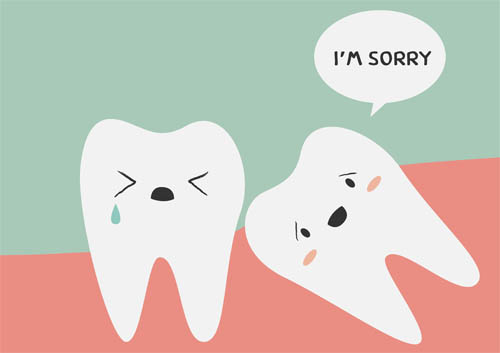Dental Infections
March 13th, 2018

Dr. Vincent Cardinale and Dr. Chris Moody and our team at Cardinale Dentistry will tell you that dental infections can be very serious; sometimes, they develop into a life-threatening situation. Cavities are caused by acid-generating microorganisms that deposit themselves on teeth surfaces. Over time, acid erodes tooth enamel, compromising tooth strength. The major culprit or cause of cavities is sweets, but even diet soda plays a substantial role in tooth erosion, largely because the phosphoric acid it contains alters the oral pH. Cavities can pave the way for other, more serious infections to develop.
Types of infections
Pulpitis
Pulpitis is an inflammation of the tooth pulp. It typically occurs when cavities get deep enough to allow infection to reach the pulp. When this happens, bacteria travel through the pit or fissure that the cavity created. It can also develop from a fractured tooth. The symptoms may include moderate pain that comes and goes. Pain may intensify when cold liquids touch the pulp.
Periodontitis
Periodontitis is a consequence of chronic gingivitis, which occurs when the supportive bone structure of the tooth erodes, causing the periodontal tooth ligament to detach from the tooth. Kids between the ages of 12 and 17 and adults over age 30 are most likely to develop this disease. In severe cases of periodontitis, a periodontal abscess may form. Symptoms of the infection typically include redness, sensitivity to touch, and swelling.
Pericoronitis
Pericoronitis is an infection that occurs when food particles and other microorganisms get trapped under gum flaps. It typically happens when impacted wisdom teeth erupt. Pain at the site of the infection is a common symptom. You should try to prevent food particles from lodging in the gingivitis flaps.
Dental abscesses
A dental abscess is one of the most serious dental infections anyone can get. It begins at the base of the tooth, but without treatment can spread rapidly. When the abscess is more severe, the bacteria spread, often very rapidly, and cause severe facial swelling, pain, and discomfort.
The best way to minimize the risk of developing a dental infection is by practicing good oral hygiene, making sure that food or other particles aren’t trapped between the teeth for too long, flossing, using oral rinses that bear the ADA seal of approval, and seeing the dentist regularly. If or when there are any symptoms of infection, even if the only symptom is pain, be sure to visit the dentist. Early intervention may prevent the infection from escalating into something far more severe, painful, and costly to treat.
To learn more about dental infections, or to schedule an appointment with Dr. Vincent Cardinale and Dr. Chris Moody, please give us a call at our convenient Naples, FL office!




